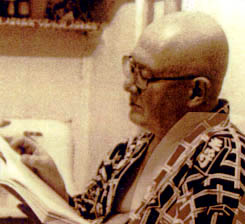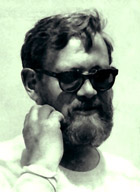|

Philip Whalen
Whalen's finicky, self-conscious, urbane, pointillist sketching features high detail-resolution. A patient reader will pick up on brilliant perceptual moments of stillness, clarity and depth that accumulate small shocks in contemplative micro-spaces. That unexpected, instantaneous "shift from opacity to brilliance" Whalen speaks of in his firewatching poem "Sourdough Mountain Lookout" encapsulates his stylistic signature: "The Zenbos say, 'Lightning-flash & flint-spark.' " [p. 20].
A self-acknowledged tendency to "bald-faced didacticism" in "moving from the particular to the general" [p. 50] sometimes pushes the vividly articulated moments of Whalen's poetry over the edge of their synapses toward wisdom, or beyond themselves into philosophical enlargement. The teacher in this poet lurks never too far beneath the surface of the amused or bemused observer.
Yet even the most generalizing of Whalen's poems has a way of turning itself inside-out with a deft, koan-like touch, as in "The Dharma Youth League," a small account of sudden enlightenment-within-confusion written in Kyoto in 1966:
I went to visit several thousand gold buddhas
They sat there all through the war, --
They didn't appear just now because I happened to be in town
Sat there six hundred years. Failures.
Does Buddha fail. Do I.
Some day I guess I'll never learn. [p. 172]
However ironically self-distanced, Whalen's poems are haunted by an odd tone of disappointment, which lingers as a kind of shade around the focused light of many long, monastic 'single room in the city' nights. [p. 50]. The Whalen writing persona is lonely by fate, not by choice, and the sense of failure seems to have to do not with fame or success but with an inability to finally catch up with his poetry's elusive, magnetic Muse.

Philip Whalen, 1960s
photo Ken Walden
from the back cover of «On Bear's Head», 1969
courtesy Dale Smith
Half metaphor and half real if anonymous woman, this tantalizing Muse-figure, beckoning from behind a veil in the 1958 "Complaint: To the Muse" and from beyond an ocean of thought in the 1969 "Scenes of Life at the Capital," is finally encountered up close in Whalen's 1971 Bolinas poems, prevailing over the local poets' landscape like a cross between a beguiling Circe and a garrulous Fairy Queen, "babbling on without making any sense at all." [p. 229].
The poet's Missing Muse, source of extended provocative absences and occasional, empty-headed yet spellbinding, 'MAGNIFICENT' presence [p. 229], is the secret heroine as well as the sublime enabler of «Overtime». A reader who'd like to hear more about her might look up early Whalen collections, or the 1959 Grove Press «New American Poetry» to discover her origins in love poems mysteriously excluded from this selection.
By turns tender, teasing, crochety and doting, Philip Whalen's invocations of his alluring screwball goddess go a long way toward developing his work's cranky, vulnerable, eccentric, withdrawing bachelor persona. Addressing her with an adoring mock-annoyance that curiously recalls Swift's writings to his beloved Stella, this flopped-out, self-deprecating hipster-bodhisattva with wine glass and joint, scribbling in his monkish cabin by the light of an ancient Chinese moon, remains perhaps the finest comic creation of the Beat era.
Tom Clark's latest poetry book is White Thought (Hard Press/The Figures)
|
|
